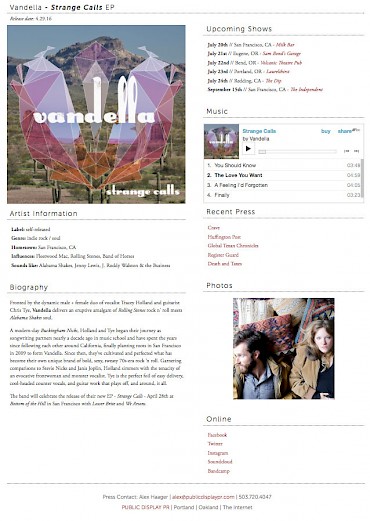 “Every unsigned band I’ve ever talked to thinks that there’s this date: the release date. And after release date is get famous!” describes Portia Sabin, president of the 25-year-old record label Kill Rock Stars and host of the music industry podcast The Future of What. “But there’s no plan for how that would happen.”
“Every unsigned band I’ve ever talked to thinks that there’s this date: the release date. And after release date is get famous!” describes Portia Sabin, president of the 25-year-old record label Kill Rock Stars and host of the music industry podcast The Future of What. “But there’s no plan for how that would happen.”
Set Goals
“Artists, know thyself, ” Sabin says. Have a hard conversation with yourself and your bandmates because “you have to figure out who you are as a band and sometimes that requires a level of honesty with yourself that you’re not that comfortable doing,” she says. “If you don’t know who you are as an artist, how are you going to market yourself?” Know your audience because there’s a good chance that those who will write about you are also a fan on some level.
It’s important to “find your own threshold of what success means to you,” adds Casey Jarman, ex-Willamette Week music editor, Party Damage Records co-founder and current marketing director for Mississippi Studios. From Facebook likes to selling out shows, “There are so many different paths and measurements of what success means,” he says. But what’s most important is: “Are you happy?”
“It is completely different for everyone,” says Chris Hnat, a publicist at Grandstand Media who works with local and national artists as well as businesses and festivals like Tender Loving Empire, Dirtnap Records and Pickathon. “Everyone has their own personal idea of what they’re going for.”
Have a Plan and Stick to It
To start, do not make any release plans until you’ve consulted with those you plan (or hope) to work with—this includes record labels, publicists and management. If you’re lucky enough to have even one of these, it is his or her job to be the expert and your job to follow advice—especially if you’re paying for it!
“We can open the door to some degree,” says Sierra Haager of Public Display PR, whether that’s getting a national premiere or local press. She also offers clients lots of information about the work they should be doing concurrently. Those that take the instruction manual and use it “tend to be really successful,” she says. They start to learn “how to show value to the people they want opportunities from,” and that includes other industry professionals like bookers.
Be Organized
 Being organized means having a solid media kit and press assets that are easily accessible. Public Display PR creates a clean, informative presence for every one of its clients. Click to learn how to make your own killer press kit!Have an updated web and social media presence that contains the basics: bio, photos and streaming music (both video and audio) in an accessible format. “You want to make the person’s job really easy,” Haager says. “You don’t want to ever be giving anyone homework.”
Being organized means having a solid media kit and press assets that are easily accessible. Public Display PR creates a clean, informative presence for every one of its clients. Click to learn how to make your own killer press kit!Have an updated web and social media presence that contains the basics: bio, photos and streaming music (both video and audio) in an accessible format. “You want to make the person’s job really easy,” Haager says. “You don’t want to ever be giving anyone homework.”
Have a Story
“There’s nothing you can do for yourself that’s stronger than having a cool or interesting story,” Sabin says. “You have to have something that makes you stand out.” But, “The story has to be real,” Haager says, and relevant to your audience. “If you’re trying to be everything to everyone, you’re just going to be nothing to no one.”
Know Who You’re Pitching
Having strong assets are important, but you must “also understand what the person who you’re talking to is looking for,” Haager says. Publications have schedules (weekly, monthly, quarterly) that can require months of advance notice, and not all outlets publish the same type of content—so don’t ask for an album review or premiere from someone who doesn’t do that. Understand what certain publications do before reaching out, and give them enough lead time to properly consider your inquiry.
Establish Relationships
Find writers who write about music that is similar to yours and pitch them directly. Start with local press and engage them—introduce yourself before your release day is already upon you. “It’s generally going to make for a better building process for an artist to start locally because then you can see the success happening,” Jarman explains. You might also find an enduring evangelist for your music.
Be Responsive
If your media kit is solid, most of your info should already be readily available (including bio, photos, streaming media, current tour and release dates), but be prepared to provide anything else that’s needed. Be ready to put in the effort to actively promote yourself and answer any follow-up questions in a timely manner.
Get more advice from Public Display PR on taking better band photos or how to write a brilliant bio!
Be A Working Professional
The media likes to see talent that’s demonstrated some level of success. Anyone can record music and release it via Bandcamp, but touring shows a certain level of accomplishment, especially if you’ve performed with other notable or rising acts. It also demonstrates that you’re active and doing work to “get your name out there,” Hnat says. “Touring is hands down the most important part of publicity for any band.”
Follow Up
Didn’t hear anything the first time? Reach out again, especially if you have something new to report, and especially, especially if that new thing demonstrates your growth and success. Send the press you’ve gotten since the first inquiry, show that your band now has a video with 100,000 views on YouTube.
Press Leads to More Press
It’s as simple as that: If your rocket is starting to soar, more people are going to want to get on board for the ride. Share all of the press you get—on social media and with other media outlets.
Have a Budget
Do not ask a publicist to work for free—you wouldn’t do that to your waiter. And just like publications need lead time, so does your publicist to properly unveil your release.
Be Patient
“Bands always want to get things out as quickly as possible,” Jarman says. But it’s prudent to slow down and think about your strategy. If you’re a new act, Haager makes a case for releasing singles and videos only because, frankly, no one cares about your full-length debut if they’ve never even heard of you before. Focus on dropping several well-produced and -packaged pieces of content, staggered over time, rather than an entire album.









